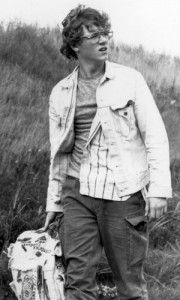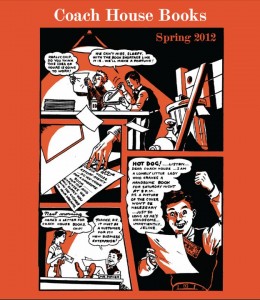 I read with interest last night the news that C-Span founder Brian Lamb’s decided to step aside as active CEO of the network, leaving the leadership to a two-person combo, Susan Swain and Rob Kennedy. I’ve worked with Brian and Susan and I’m very happy for them both–for Brian, who can step back a bit after close to three decades in day-to-day leadership of the innovative network, and for Susan, who like Brian has always been a pleasant presence on-screen and great to deal with on any matters relating to their prodigious coverage of nonfiction books. In fact, if publishers and authors have not given C-Span an award for its coverage of current affairs and issues books, it’s hight time we as an industry did so.
I read with interest last night the news that C-Span founder Brian Lamb’s decided to step aside as active CEO of the network, leaving the leadership to a two-person combo, Susan Swain and Rob Kennedy. I’ve worked with Brian and Susan and I’m very happy for them both–for Brian, who can step back a bit after close to three decades in day-to-day leadership of the innovative network, and for Susan, who like Brian has always been a pleasant presence on-screen and great to deal with on any matters relating to their prodigious coverage of nonfiction books. In fact, if publishers and authors have not given C-Span an award for its coverage of current affairs and issues books, it’s hight time we as an industry did so.
I got to know Brian, and Susan, when as an editor with Times Books of Random House I edited a book with him in 1998-99. It was Booknotes–Life Stories: Notable Biographers on the People Who Shaped America, drawn from Brian’s on-air conversations with the more than 500 biographers he’d interviewed on “Booknotes,” the program that preceded his current showcase, “Q&A.” Imagine a book filled with the insights of Robert Caro (on LBJ), Ron Chernow (on John D. Rockefeller), and Blanche Wiesen Cook (on Eleanor Roosevelt), and multiply it times a couple hundred. One of the great evenings of my career was the night we launched the book at Barnes & Noble’s Union Square store, with Brian moderating a discussion among Caro, Chernow, and Cook. After the signing, as we all headed across the Square to a restaurant I had the chance to introduce myself to Caro, whose indomitable book on Robert Moses, The Power Broker, had crystallized in me a dream to live in New York long before it was a practical possibility. As we were crossing 17th Street, I said to Caro, “Your book made me nostalgic for the city and a time I never lived in.” Caro stopped in the street, turned to me and in his broad Bronx accent marveled, “No one’s ever said that to me.” I was some kind of glad that night, especially when Caro later told me that he long admired my late author Edward Robb Ellis and his books, The Epic of New York City and A Diary of the Century.
Working on the manuscript with Brian, he was always self-effacing and eager to hear my take on the material. Despite what I’ve seen expressed by a few commenters below the TPM story on this development, C-Span has no partisan agenda, and neither does its founder. And the neutral ‘C-Span look’ that hosts have when callers phone in and make their aggressively partisan points? It’s no accident; rather, it’s a product of Brian’s studious refusal to choose sides in Washington. By now, if a D.C. backbench politician isn’t being heard, it’s not for lack of opportunity via C-Span and other cable networks. I’d argue that C-Span has made hearing from politicians almost routine, and while we may feel we get too much of them nowadays, I believe that’s an improvement over the era when few members of congress not in leadership positions were even heard from.
Detractors might say that Speakers of the House still control the camera, and that’s true, but not for lack of C-Span trying to expand the number of lenses positioned in the chamber. Now, if the Supreme Court would finally accede to Lamb’s request that they allow cameras in their Court–something he’s asked for repeatedly over the past several years–we’d also have a somewhat more open third branch of government.
 I look forward to attending the 2012 Sidney Hillman Foundation Prize reception at the New York Times Center on May 1, and am pleased that friend and fellow blogger Tom Watson of causewired.com has invited me and other bloggers as a special contingent for the evening. Among the honorees that night will be the amazing Ta-Nehisi Coates who writes and publishes great blog essays at the Atlantic, ColorLines: News for Action who will be recognized for their report, Thousands of Kids Lost From Parents In U.S. Deportation System, and Frank Bardacke, author of of the current book Trampling Out the Vintage: Cesar Chavez and the Two Souls of the United Farm Workers from Verso Books.
I look forward to attending the 2012 Sidney Hillman Foundation Prize reception at the New York Times Center on May 1, and am pleased that friend and fellow blogger Tom Watson of causewired.com has invited me and other bloggers as a special contingent for the evening. Among the honorees that night will be the amazing Ta-Nehisi Coates who writes and publishes great blog essays at the Atlantic, ColorLines: News for Action who will be recognized for their report, Thousands of Kids Lost From Parents In U.S. Deportation System, and Frank Bardacke, author of of the current book Trampling Out the Vintage: Cesar Chavez and the Two Souls of the United Farm Workers from Verso Books.





